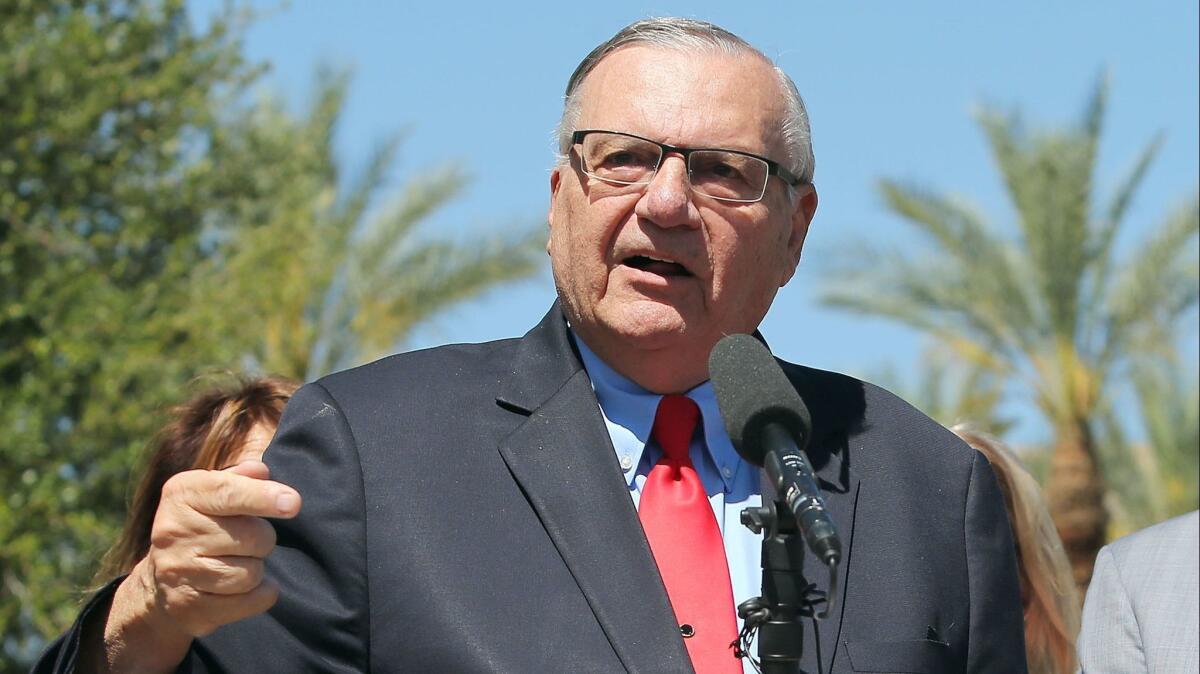Stymied elsewhere, Trump turns to pardons to advance personal and policy goals

As a candidate for president, Donald Trump vowed to accomplish a great many things with the ease and simplicity of snapping his fingers.
Once in office, however, he discovered that achieving those goals — dismantling Obamacare, slashing the federal debt, building a wall along the border with Mexico, among other promises — was far more frustrating and complicated than he supposed.
There is one area, however, where Trump can exercise nearly limitless sway: the power to pardon. He has made early and eager use of that unfettered authority, advancing his political agenda in the process.
His most recent exercise of this power came this week when he pardoned two Oregon ranchers serving five-year sentences for deliberately setting fire to federal lands — a case that sparked the armed takeover of a wildlife refuge and stoked the anti-Washington sentiments forever stirring in the rural West.
The pardons were the sixth and seventh of Trump’s presidency, and while the beneficiaries have been as disparate as Jack Johnson, the late black boxing champion victimized by Jim Crow law, and Joe Arpaio, the Phoenix sheriff convicted of racial profiling, a common thread has been the notion of prosecutorial overreach.
It is something the president clearly empathizes with, seeing himself as the victim of an unwarranted and overzealous probe into his campaign’s ties, if any, to Russian interference in the 2016 election.
It is also another of the countless ways Trump has shattered conventional norms.
He does seem to be doing this for political purposes.
— James Pfiffner, a George Mason University expert on presidential pardons, on President Trump’s unusual approach
Most recent presidents have issued their highest-profile pardons on the way out the door, sort of a last act of grace, and have followed a process overseen by the Justice Department’s Office of the Pardon Attorney, which generally requires a five-year waiting period for applicants and, ideally, expressions of contrition and regret.
Trump has acted far more impulsively, singling out individuals whose cases appeal to his political base, whether the unapologetic conservative provocateur Dinesh D’Souza, who was convicted of campaign finance fraud; the Oregon ranchers, Dwight and Steven Hammond, who became martyrs to their fellow anti-government acolytes; or Arpaio, the public face of border-enforcement bellicosity.
“It’s unusual for a president to pick out a few of these high-visibility cases and announce them in the middle of his term,” said James Pfiffner, a policy professor at George Mason University, who has written about the presidential power to pardon. “He does seem to be doing this for political purposes.”
Also unusual — though perhaps not surprising for a president who comfortably straddles the worlds of politics and pop culture — has been the key role of special-pleading celebrities.
Actor Sylvester Stallone urged Trump to pardon Johnson and right a decades-old disgrace rooted in racism. The release of Alice Marie Johnson, 63, who was serving a life term for cocaine distribution and money laundering, came at the behest of reality TV’s Kim Kardashian West.
Other cases the president is mulling seem driven either by a desire to settle scores or having a personal relationship. He has mused about pardoning lifestyle doyenne Martha Stewart, who was prosecuted for stock manipulation by Trump nemesis James Comey; and also former Illinois Gov. Rod Blagojevich, a Democrat who went to prison for corruption and was a one-time contestant on Trump’s “Celebrity Apprentice.”
The idea of federally sanctioned forgiveness being dispensed on the basis of presidential whimsy or star-power advocacy strikes some as troublesome and unfair.
“Trump appears to be relying exclusively on random, unofficial sources of information and advice to select the lucky beneficiaries of his official mercy,” Margaret Colgate Love wrote in the Washington Post. She ran the federal clemency program in the George H.W. Bush and Clinton administrations and is now a private attorney, representing dozens of clients seeking pardons or sentence commutations.
“There are many reasons to be guardedly grateful that Trump has taken an interest in this time-honored constitutional power,” Love wrote. “But now we must encourage him to use it more responsibly for the benefit of those who have no friends in high places.”
To his credit, Trump — unlike some recent predecessors — has acted early enough in his term to let voters weigh in on his extrajudicial judgment in the midterm election.
When Bush pardoned former Defense Secretary Caspar Weinberger and five other former government officials in the Iran-Contra scandal, outraging prosecutors, he did so in December 1992, as he prepared to leave office.
Clinton provoked a major outcry when he pardoned tax cheat and fugitive financier Marc Rich, whose ex-wife, Denise, was a major donor. But he faced no consequence, save for tarnishing his legacy, as the move came in the waning days of his presidency.
“Being upfront in pardoning people that he likes, somebody like Arpaio or the ranchers, gives voters a chance to respond” to Trump’s actions, said Daniel Kobil, a professor of constitutional law at Capital University Law School in Columbus, Ohio, and an expert on presidential pardons. “If people don’t like that kind of favoritism and political use of that power, they have recourse in the voting booth.”
The ultimate question is whether the president would pardon himself, if need be, or others accused of wrongdoing in the Russian-meddling investigation.
Experts disagree on whether Trump has the power to shield himself — he insists that he does — but the one certainty is that doing so would provoke an epic legal and political fight that no amount of presidential power could will away.
mark.barabak@latimes.com | Twitter: @markzbarabak
More to Read
Get the L.A. Times Politics newsletter
Deeply reported insights into legislation, politics and policy from Sacramento, Washington and beyond. In your inbox three times per week.
You may occasionally receive promotional content from the Los Angeles Times.











